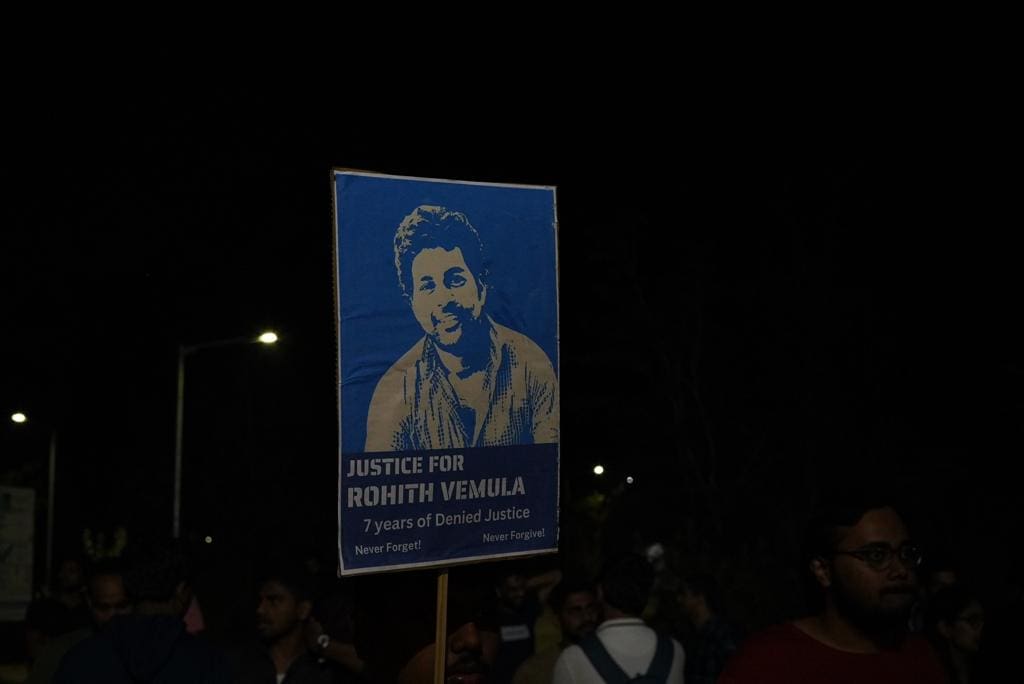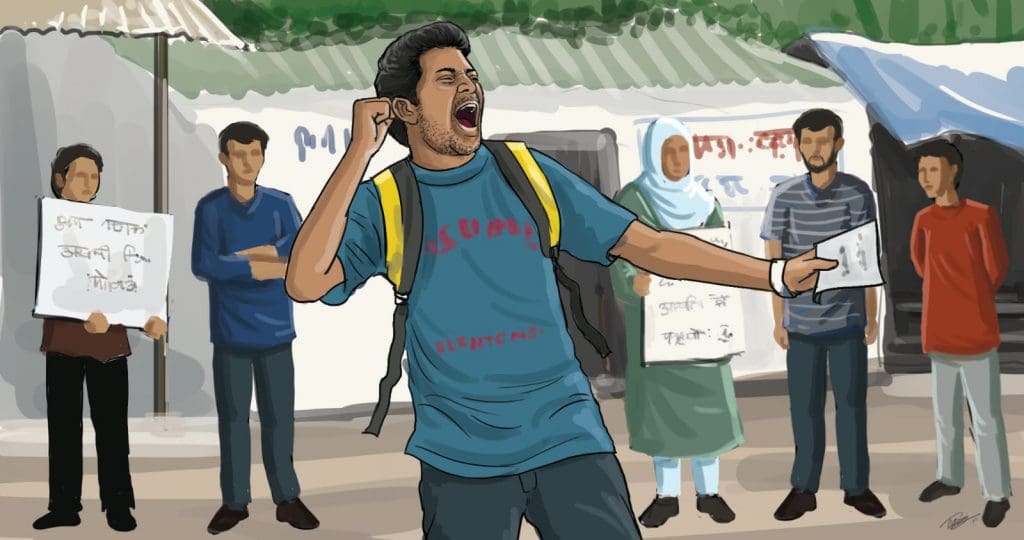
When the higher education institutions which have to be the citadels of wisdom and knowledge become the warehouse of hatred and discrimination based on caste, gender and class, the number of martyrs increase and unfortunately most of them are from Dalit, Advasi and minority communities. The first generation learners of these marginalized communities who come to universities are not only the hope of their families but also represent their entire communities. It is excruciating that the structured hierarchy of the society always outcast them and let them in a vicious circle of catch-22.
On 17th January of 2016, Rohith Vemula, a Dalit PhD scholar from the University of Hyderabad was institutionally murdered. Today remarks the seventh year of denied justice to Rohith himself, the mother who lost her son Radhika Vemula, the other four PhD scholars who were suspended along with Rohith and the student community who led the Rohith Movement. In this university, many students lost their lives due to the downright failure of the administration. The university never took the responsibility of their failure when they been the sole reason behind the suicide letters of students who were forced to take their own lives. Rohith in his final note wrote “my birth is my fatal accident,” which he wouldn’t have regretfully felt, if he wouldn’t have been rusticated and socially boycotted by the university.
When we dig the route towards the master brains of this institutional murder, it starts from the then president of Akhila Bharathiya Vidhyarthi Parishat unit in the university, Susheel Kumar, who filed a false allegation of physical assault against the five Dalit scholars, the leaders of Ambedkar Students’ Association. He was supported by the then BJP MP and Union Minister for Labour and Employment Bandaru Dattatreya who wrote to the then MHRD minister Smriti Irani complaining that students were involved in “anti national and casteist” activities. She ordered the then Vice Chancellor Appa Rao Poddle to intervene in the issue. Earlier when he was the chief warden, Appa Rao was questioned by ASA for his practice of casteism in the university. Therefore, when this issue came on his table, using the power of a Vice Chancellor he took revenge. This ultimately resulted in the historic inhuman social boycott of five Dalit scholars from the university. They were not allowed to enter their mess, the fellowships were on hold for more than seven months, and were strictly restricted to access any of the university spaces and interact with people. The suspension order demanded them to vacate their hostel rooms and that resulted in the setting up of Velivada, the Dalit ghetto at the North Shopping Complex in the University.
The four scholars who were suspended along with Rohith are still going to the court every month for the hearing of the cases filed against them by the university. Sunkanna, one of them couldn’t fetch a job even after he tried in more than twenty three institutions and left with no hope rather than going back to his native village only to do farming by holding a PhD degree. The only solace in the recent past is that two of them, Dontha Prasanth and Seshaiah Chemudugunta successfully submitted their PhD thesis along with their continuous struggle for dignity and justice.
Rohith Vemula’s death was not just coincidental but it was the result of the execution of plans by the unforgivable structure of the caste Hindu nation. Since 1970, including Rohith’s death, there have been twelve institutional murders perpetrated by the University of Hyderabad.
Senthil Kumar, a Dalit PhD scholar from Tamil Nadu lost his life in 2008, because no supervisor was allotted to him and was subjected to caste discrimination. Pulayala Raju, a Dalit student from Integrated Masters also had gone through discrimination, his results and semester registration were repeatedly delayed, his accusation of mess facilities was also barred and these ended his life in 2013. In the same year, Madari Venkadesh, despite his erudite scholarship, a third year PhD scholar was deliberately not given a supervisor after his previous supervisor got retired and that resulted in him killing himself. In 2018, Rasmi Ranjan Suna a Dalit PhD scholar from the state of Odisha lost his life after battling with dengue and in 2020 another Dalit PhD scholar, Surya Pratap Bharathy, from Uttar Pradesh who had also lost his life when suffered from a sudden stroke during the time of lockdown. Thus, two first generation learners lives and their effort to travel till here were gone in vain due to the incompetency of the health center facility in the university, administration’s lethargy towards the lives of Dalits and the medical negligence.


Rohith, being an unsurpassed scholar who secured JRF in both Sciences and Social Sciences, who wanted to be a writer like Carl Sagan, had been conscious about the surroundings, the “immediate identities,” nature, socio-political structure of the society and had been politically vocal. He always had the audacity to question the power and in his letter to the Vice Chancellor as a response to their suspension, he wrote:
“Donald Trump will be a Lilliput in front of you. By seeing your commitment, I am tempted to give two suggestions as a token of banality.1. Please serve 10 mg Sodium Azide to all the Dalit students at the time of admission. With direction to use when they feel like reading Ambedkar.2. Supply a nice rope to the rooms of all Dalit studentsfrom your companion, the great Chief warden.”
Since he didn’t see any “easy exit” for scholars like him, he requested the VC to arrange ‘Euthanasia” for them. He being sensible and sensitive towards the prevailing issues invited all the troubles and finally brought him back as “the stardust.” If that was a sin and then that was all he did; to become the moral courage for all the students to stand against all sorts of caste discrimination which are institutionally validated and are persecuted.
The data of educational institutional murders are not even accessible and are enormous in number. The names lives in the hearts of people who lead self respect includes Rajani S Anand, Dr. Anitha, Dr. Payal Tadvi, Fathima Lateef and many more known and unknown martrys. We can only wish that no such names should be enshrined in history anymore. To smash the hierarchy of caste discrimination, we should dismantle the brahmanical power structure. If we attain a nation where everyone is treated equally, we will be indebted to the martyrdom of all the above-mentioned students and Rohith Vemula’s name will be written in golden letters in the hearts of millions because both alive and dead Rohith is revolutionary.
Today, on the seventh Shahadat Din of Rohith Vemula, under the banner of Justice for Rohith Vemula, led by Ambedkar Students’ Association, the student community is going to organize a commemoration ceremony at the University of Hyderabad. The chief guest is Chandra Sekhar Azad, the national president of Azad Samaj Party and co-founder of Bhim Army. Kaki Madhava Rao, retired IAS officer who has been there as a pillar of support for the Rohith Vemula Movement is the special guest. Advocate Jai Bheema Rao is a lawyer at the High Court of Andhra Pradesh who has been handling several cases till date pertaining to the movement, is one of the speakers. Avanthi, a survivor of caste killing in Hyderabad is also going to address the gathering. Dr. Joby Joseph, Associate Professor in the Center for Neural and Cognitive Sciences, School of Medical Sciences, University of Hyderabad who has been with the student community since the movement is the other speaker. Apart from them, Radhika Vemula, mother of Rohith is also joining for the commemoration ceremony.
Sabari Girija Rajan, a PhD scholar at University of Hyderabad, is the president of Ambedkar Students’ Association.



